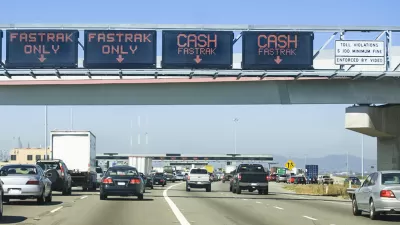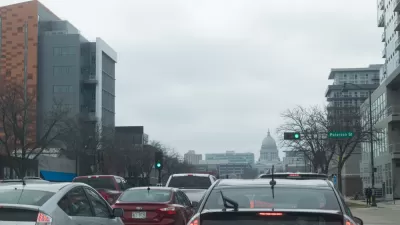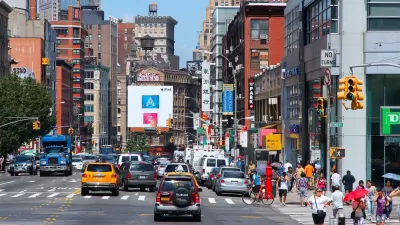The editorial board of the Toronto Star picks a side in the policy debate over highway tolling.

The Toronto Star published an editorial that takes a pair of political stances with regard to the implementation of highway tolls: yes, the tax is regressive, placing more burden on low-income commuters than more affluent drivers. But toll roads can still be a benefit to low-income residents.
To reach the conclusion about toll roads being a regressive tax—a familiar and frequently employed talking point in the argument against toll roads—the editorial relies on a federal briefing note prepared for deputy finance minister Paul Rochon in February and obtained by The Canadian Press through the access to information process. "The internal analysis found that, while higher income people are heavier users of road infrastructure, three-quarters of the less-well-off still rely on the road network and therefore could be hit by tolls," according to the editorials.
The editorial's argument in response to the acceptance of toll roads as a regressive tax, is that it can also generate funding and provide benefits for low-income citizens. "Indeed, highway pricing delivers a dual benefit. It’s a way of potentially raising hundreds of millions of dollars for transit each year, depending on the nature and location of tolling systems. And it eases gridlock by convincing more drivers to leave their vehicle at home and opt instead for alternatives such as car pooling, telecommuting or riding transit."
FULL STORY: Road tolls needn’t be bad for the poor: Editorial

Planetizen Federal Action Tracker
A weekly monitor of how Trump’s orders and actions are impacting planners and planning in America.

Map: Where Senate Republicans Want to Sell Your Public Lands
For public land advocates, the Senate Republicans’ proposal to sell millions of acres of public land in the West is “the biggest fight of their careers.”

Restaurant Patios Were a Pandemic Win — Why Were They so Hard to Keep?
Social distancing requirements and changes in travel patterns prompted cities to pilot new uses for street and sidewalk space. Then it got complicated.

Platform Pilsner: Vancouver Transit Agency Releases... a Beer?
TransLink will receive a portion of every sale of the four-pack.

Toronto Weighs Cheaper Transit, Parking Hikes for Major Events
Special event rates would take effect during large festivals, sports games and concerts to ‘discourage driving, manage congestion and free up space for transit.”

Berlin to Consider Car-Free Zone Larger Than Manhattan
The area bound by the 22-mile Ringbahn would still allow 12 uses of a private automobile per year per person, and several other exemptions.
Urban Design for Planners 1: Software Tools
This six-course series explores essential urban design concepts using open source software and equips planners with the tools they need to participate fully in the urban design process.
Planning for Universal Design
Learn the tools for implementing Universal Design in planning regulations.
Heyer Gruel & Associates PA
JM Goldson LLC
Custer County Colorado
City of Camden Redevelopment Agency
City of Astoria
Transportation Research & Education Center (TREC) at Portland State University
Camden Redevelopment Agency
City of Claremont
Municipality of Princeton (NJ)





























